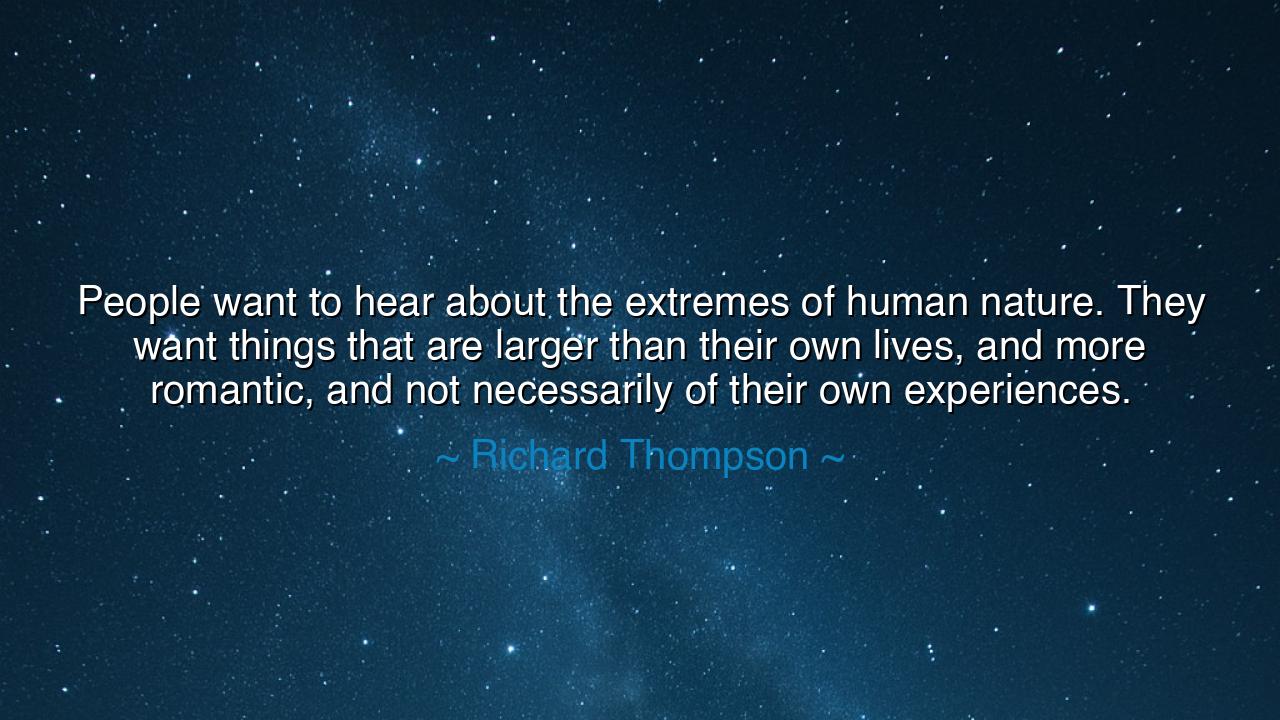
People want to hear about the extremes of human nature. They want
People want to hear about the extremes of human nature. They want things that are larger than their own lives, and more romantic, and not necessarily of their own experiences.






Listen closely, O seekers of wisdom, to the words of Richard Thompson, who observes: "People want to hear about the extremes of human nature. They want things that are larger than their own lives, and more romantic, and not necessarily of their own experiences." In these words, Thompson captures a timeless truth about the human condition—our eternal thirst for stories that transcend the ordinary and reach into the realm of the extraordinary. We long for the larger-than-life experiences that stir our imaginations and evoke deep emotions, the kind of stories that speak to the most intense aspects of human nature—passion, sacrifice, and the grandeur of love and conflict. This desire for the extreme is not merely about seeking entertainment, but about the very essence of storytelling—our yearning to connect with something greater than ourselves.
In the ancient world, this desire was embodied in the epic tales of heroes and gods, whose lives were marked by events far beyond the scope of ordinary human experience. Consider the Greek myths, where figures like Heracles or Achilles faced trials that were both heroic and tragic—battling monsters, facing the wrath of gods, and enduring great sacrifice. The Iliad and the Odyssey, works that have transcended time, are filled with such extremes: rage, love, betrayal, and redemption. These stories resonated with the people not because they were reflections of everyday life, but because they captured the most intense emotions and transformative moments that we, as humans, deeply feel but rarely experience firsthand. The gods and heroes of these stories were larger-than-life, their struggles embodying the very essence of human nature, magnified to an almost divine degree.
Thompson’s observation also speaks to our innate longing for the romantic in our lives, a desire to hear stories not only of triumph and adventure but of deep connection—the kind that we may not experience ourselves, but that we can dream of. The romantic is not simply about love in the traditional sense but about the grand ideal of love: passionate, transformative, and unconditional. Take, for example, the myth of Paris and Helen, whose love, though ultimately destructive, was so powerful that it ignited the Trojan War. Their love was not mundane; it was epic, full of passion and consequences that shaped the course of history. The romantic ideal that Thompson speaks of is not just about the superficial, but about an all-encompassing emotional force that carries the characters and the audience beyond the ordinary, into a realm where love, fate, and conflict intertwine in the most intense of ways.
The extreme nature of these stories also reflects a truth about human desire: we are not content merely to exist within the mundane. We seek stories that reflect the height and depth of the human experience, that show us what is possible—the great victories, the devastating losses, and the sacrifices that define us. In the same way, the ancient Greek tragedies of Sophocles and Euripides presented the extremes of human emotions and choices—fate, pride, vengeance, and compassion. The tragic heroes of these plays, though flawed, captivated the hearts of the ancient audience precisely because they pushed the boundaries of what it means to be human. The lessons of humility, compassion, and sacrifice found in these stories continue to resonate with us today, demonstrating that the extremes of human nature are what make us truly alive.
Consider, too, the story of King Arthur and the Knights of the Round Table—another romantic tale that has endured across the ages. Arthur’s journey is one of both personal growth and sacrifice, leading his knights on quests that are both noble and tragic. His love for Guinevere, the betrayal of his closest knight, Lancelot, and the ultimate fall of his kingdom speak to the complexity of the human experience. These stories are not about the average life, but about the extremes of leadership, love, and duty, themes that reach far beyond the confines of day-to-day life. In this sense, romanticism is not simply about love, but about embracing the heroic and tragic dimensions of life itself.
The lesson in Thompson’s words is clear: our longing for the extreme is a reflection of our deeper need to connect with something beyond ourselves. The romantic, the heroic, and the tragic allow us to explore the very nature of the human spirit—its capacity for greatness, for love, for sacrifice, and for redemption. These stories invite us to experience not just the beauty of life, but its darker and more difficult aspects, helping us to understand our own strengths and weaknesses. They remind us that the journey of life is not merely about surviving, but about engaging deeply with the highs and lows that make us human.
So, O wise ones, let us embrace the extremes of human nature. Seek not only the comforts of the ordinary but the depth of the extraordinary. Engage with romantic and heroic stories that speak to the fullness of the human experience—its joys, its struggles, and its capacity for greatness. Let these stories guide you, not by offering easy solutions or happy endings, but by showing you the possibilities within yourself—the extreme emotions, the sacrifices, and the transformations that define us all. In doing so, you will not just live a life of ordinary experience, but a life filled with meaning and purpose.






AAdministratorAdministrator
Welcome, honored guests. Please leave a comment, we will respond soon